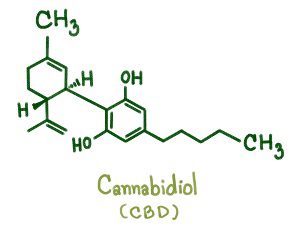CBD vs THC: What's the Difference?

Throughout the UK, there’s growing interest and speculation about cannabis, and for very good reasons. The cannabis plant is made up of different compounds; most prominent are two phytocannabinoids called tetrahydrocannabinol (THC) and cannabidiol (CBD) which interact with the human endocannabinoid system.
As much as THC and CBD have striking similarities, CBD products are preferred by a majority of people. Understanding the key difference between the two compounds will help you understand why this is so. You will also be able to have an unbiased view of the two prominent phytocannabinoids.
What is THC?
THC is known as delta-9-tetrahydrocannabinoil. When it gets into the body, it finds its way to the brain where it binds onto cannabinoid receptor (CB1) in the brain and triggers a feeling of extreme happiness. This is similar to how the body’s own bliss molecule- anandamide acts. Unlike anandamide which is quickly broken down and removed from the body, THC persists in the body for a long time to cause euphoria or “marijuana high.”
But aside from this, THC interacts with the endocannabinoid system through receptors and helps in promoting homeostasis (balance in physiological processes).

What is CBD?
Just like THC, CBD (cannabidiol) is a phytocannabinoid found in the cannabis plant as well as industrial hemp. In full, CBD stands for cannabidiol. CBD and THC have a similar chemical structure; they both have 21 carbon atoms, 30 hydrogen atoms, and 2 oxygen atoms. However, a slight variance in the placement of one hydrogen atom accounts for the difference in characteristics of the two compounds.
Unlike THC, CBD does not bind to the CB1 receptor which is present in the brain. Hence, it is not psychoactive.

Why is CBD preferred to THC products?
The answer is simple, euphoria. As much as this rush of excitement is good for recreational purposes, there are a couple of things that might worry you as a consumer:
- Some studies have shown that long term use of THC may cause impaired brain development.
- THC has been shown to impair judgement and prolong reaction time.
- THC has been shown to trigger short term memory loss
- THC also causes short term negative effects such as: tachycardia, bloodshot eyes, dry eye and mouth and in rare occasions it may cause paranoia.
It is due to theses reasons that CBD products are preferred to THC products. CBD products provide similar support to the endocannabinoid system without jeopardizing the health and well being of the consumer.
How does CBD & THC Interact with the Human Body
The endocannabinoid system (ECS) is probably the most diverse system in the human body because it influences a vast number of functions and processes to ensure that the body is functioning optimally. Surprisingly, it derives its name from plant-based cannabinoids such as THC and CBD. If this caught you by surprise, don’t you worry; I will go right ahead to explain this chicken and the egg story.
Back in the 1960s, Robert Mechoulam a professor at the Hebrew University of Jerusalem discovered and isolated the cannabinoid THC from the cannabis plant. He then went ahead to find the receptors through which THC and other cannabinoids interact with the human body. Together with other scientists and over the years, they have been able to piece together this system that is now referred to as the endocannabinoid system.
The ECS is made up of three components namely; cannabinoid receptors, the body’s own endocannabinoids and metabolic enzymes. These components work together to maintain physiological homeostasis in the body.
Among the critical functions controlled by the endocannabinoid system include sleep, mood and appetite among others. The goal is to always establish homeostasis of the body in a physiological state. The council of Europe guidelines on supplements (2005) defines homeostasis as “the status of a person whose physiological parameters function within limits considered as normal.” Plant-derived cannabinoids such as CBD help support, maintain and optimize the functions of the ECS without blocking, altering or modifying it. You can find the evidence-based benefits of CBD here.
5 key differences between THC and CBD
1. Concentrations in hemp and marijuana
Many people often mistake hemp and marijuana to mean one and the same thing. Industrial hemp in the UK contains trace amounts of THC; ideally it should contain less than 0.2% THC. Marijuana on the other hand could contain as much as 25%-30% THC. As a rule of thumb, cannabidiol oil mainly refers to hemp-derived CBD oil that has trace amounts of THC and is consequently not psychoactive. On the other hand, cannabis oil infers the product as significant amounts of THC in it and is therefore psychoactive. You will understand more on the psychoactive properties of THC later in this article.
2. Chemical structure
Both THC and CBD are synthesized from the same precursor; cannabigerolic acid (CBGA). This happens to be the precursor for all cannabinoids too. CBGA is cyclized into THCA and CBDA which are later decarboxylated into THC and CBD respectively. It is interesting to note that THC and CBD have an identical molecular structure; the only difference is in the placement of one atom. They each contain 30 hydrogen atoms, 21 carbon atoms and 2 oxygen atoms. Whereas THC forms a cyclic ring, CBD forms a hydroxyl group. This slight difference in the arrangement of one atom accounts for the vast differences in how the two compounds interact with the human body. Their molecular mass of THC is 314.469 g/mol while that of CBD is 314.464 g/mol.
3. How they bind to cannabinoid receptors
Plant cannabinoids bind to receptors in the human endocannabinoid system to be able to exert their supportive effects. There are two kinds of receptors in the ECS: CB1 and CB2 receptors. CB1 receptors are prevalent in the central nervous system while the CB2 receptors are prevalent in the immune and peripheral systems.
The slight difference in chemical structures between THC and CBD account for how they interact with these receptors. You should understand that the cannabinoids and receptors attach to each other in a key and lock binding mechanism. THC is able to fit into the CB 1 receptor perfectly but CBD is not able to. Because of this, THC is able to exert effects in the brain leading to the euphoria typically associated with cannabis. It also follows that CBD does not have any effects in the higher centers meaning that it does not cause euphoria and neither does it have addictive properties. This is very important to understand as it plays a pivotal role in determining the legality of THC and CBD in the UK and many other parts of the world.
4. CBD vs. THC in Drug testing
Now that we know what sets apart THC from CBD, should any of these make you worried when it comes to taking a drug test? It is first good to note that drug tests ordered by employers or other such parties are mostly screening for the use of illegal substances or those which may compromise ones judgement and rationality. They hardly want to check what nutritional regimen that a potential employee is using.
Because THC alters the state of the mind causing euphoria, it is a subject of interest for both prospective employers and the government. As it is, marijuana, which contains significant levels of THC, is classified as a schedule 1 drug in the UK and is therefore screened for in any standard drug test.
Standard drug tests can either be 5, 10 or 15 panel tests. Whichever the panel, marijuana is usually tested for in all three. Most tests detect for the presence of THC or its metabolites in plasma, serum, saliva, urine or hair specimen. Given the trace amounts of THC in cannabidiol oil derived from hemp, it is highly unlikely that it will cause you to fail a drug test.
Theoretically speaking, if you were to consume the upwards of 1,000mg of cannabidiol daily, you could accumulate enough THC in your system to fail a drug test. But even in this case, most assays are still designed to detect higher amounts of THC; only about 11%-18% of tests can detect such low levels of THC or its metabolites.
Practically speaking, 1,000mg of THC would mean that you are ingesting the equivalent of 40 CBD capsules each containing 25mg of CBD on a daily basis.
Considering this, cannabidiol products obtained from legal hemp in the UK have a close to nil chance of making you fail a drug test.
5. Are THC and CBD Legal in the UK?
Many people get confused when it comes to the legality of CBD and THC in the UK. Cannabis is a controlled substance classified under the Misuse of Drugs Act of 1971. It falls under schedule 1, meaning that it has no medicinal value and has a high potential for abuse. However, hemp-derived cannabidiol was legalized in the UK in 2016, but strictly not for sale to underage persons.
Industrial hemp can be grown and sold freely in the UK, only that it has to contain less than 0.2% THC as recommended by the Home Office. There are 63 industrial hemp strains that have been approved in the EU. Cannabidiol derived from such hemp is 100% legal. While the plant can be used for many industrial purposes, cannabidiol can be extracted from it and sold separately as a nutritional supplement to support the endocanabinoid system.




